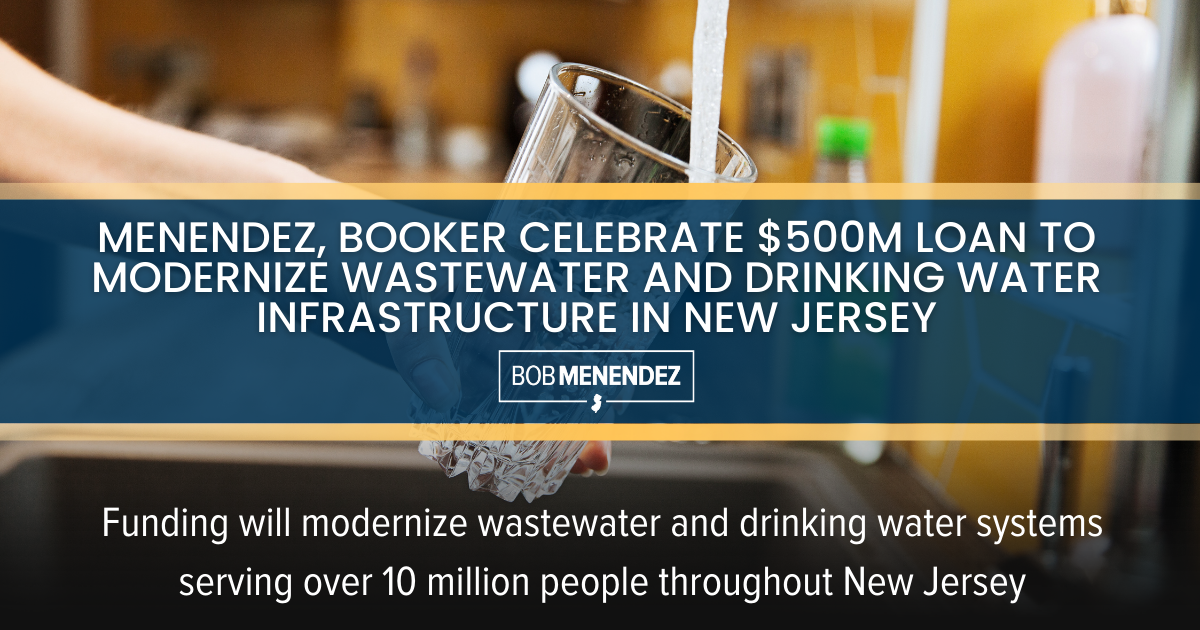Source: United States Senator for New Jersey Bob Menendez
JERSEY CITY, N.J. — U.S. Senators Bob Menendez and Cory Booker (both D-N.J.) today celebrated the U.S. Environmental Protection Agency’s (EPA) announcement of a $500 million loan to the New Jersey Infrastructure Bank to modernize wastewater and drinking water systems serving over 10 million people throughout New Jersey. This is the first loan issued through the State Infrastructure Financing Authority Water Infrastructure Finance and Innovation Act (SWIFIA) program, which provides loans exclusively to state infrastructure financing authority borrowers, commonly known as state revolving fund programs. The program was created by Congress in 2018 under the bipartisan America’s Water Infrastructure Act.
“Rebuilding New Jersey’s aging water and wastewater infrastructure and expanding access to clean, safe water while creating good paying jobs is exactly the type of smart investment our communities and environment need,” said Sen. Bob Menendez. “I’m proud to have fought for many of the provisions in the bipartisan America’s Water Infrastructure Act of 2018, which created SWIFIA, and will benefit millions of New Jersey families up and down the state with essential funding for state revolving fund programs. I thank the Biden Administration for recognizing this critical opportunity and choosing New Jersey as the first state in the country to receive a SWIFIA loan, which will ultimately have positive life-changing impacts for communities throughout the Garden State.”
“This historic infusion of federal funds will help New Jersey implement vital water infrastructure projects,” said Sen. Cory Booker. “I have championed programs to ensure every American has access to safe, clean drinking water. I am excited the EPA is issuing its first SWIFIA loan to New Jersey. This funding will create hundreds of jobs and advance water infrastructure projects to address contaminants in drinking water, install water filtration systems, and replace lead pipes across our state.”
Thanks to EPA’s SWIFIA loan and funding from the New Jersey State Revolving Fund, over 90 communities across the Garden State will be able to implement critical water infrastructure projects—remediating contaminated groundwater, replacing lead service lines, and installing filtration systems to protect drinking water from PFAS contamination. These infrastructure investments will help communities maintain compliance with regulatory requirements, manage flooding, and improve climate resiliency. Projects that will receive SWIFIA funding are located throughout the state, including in 36 smaller communities and 39 disadvantaged communities.
“From critical resilience projects to the replacement of lead service lines, New Jersey remains at the forefront of innovative water infrastructure solutions,” said New Jersey Governor Phil Murphy. “The EPA’s SWIFIA loan will further solidify New Jersey’s status as a national model for water infrastructure, which serves as the foundation for healthy communities. In addition to helping our state secure safe, healthy, and efficient wastewater and drinking water systems for all New Jerseyans, the EPA’s support will also help generate good-paying jobs in our expanding water workforce.”
“Improving New Jersey’s water infrastructure is a team effort, and we are grateful to our partners at U.S. EPA and the New Jersey Infrastructure Bank for their work to close the State’s latest WIFIA loan,” said New Jersey Commissioner of Environmental Protection, Shawn M. LaTourette. “This loan will support the Murphy Administration’s continuing efforts to modernize water infrastructure in communities across the Garden State–ensuring the highest standards of protection for public health and the environment, as we create good-paying engineering, construction, and other jobs for New Jersey families.”
The SWIFIA program is housed within EPA’s WIFIA program. SWIFIA loans allow state infrastructure finance authorities to offer additional low-cost financing to communities and accelerate implementation of important water infrastructure projects.
###
